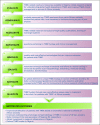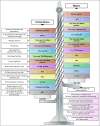Panoptic Overview of Triple-Negative Breast Cancer in Nigeria: Current Challenges and Promising Global Initiatives
- PMID: 30085829
- PMCID: PMC6223531
- DOI: 10.1200/JGO.17.00116
Panoptic Overview of Triple-Negative Breast Cancer in Nigeria: Current Challenges and Promising Global Initiatives
Abstract
Purpose Triple-negative breast cancer (TNBC) is the most deadly form of breast cancer (BC) today. TNBC treatment is fraught with challenges because of the extensive interpatient heterogeneity in clinical behavior and scarcity of stratifying biomarkers and actionable targets. Women of African ancestry face a disproportionate burden resulting from this disease, which affects them earlier and more aggressively and has a higher propensity to spread and resist conventional treatments. A much higher proportion of Nigerian patients with BC have TNBC compared with patients with BC in the United States and Europe. Methods This article spotlights Nigeria as an example of a nation wherein genetic and nongenetic spheres of influence intersect to affect the prevalence of this disease, the scale of its challenge, and its toll. Results Studies have illuminated the inherently different tumor biology of Nigerian TNBCs, which show distinct genetic variants and gene expression patterns compared with European or European-American TNBCs. Parallels are apparent between TNBC phenotypes among African Americans and Nigerians, implicating the common thread of shared genetic ancestry between these populations. Reproductive, lifestyle, socioeconomic, and cultural factors also shape TNBC outcomes in Nigeria, as do resource constraints in Nigerian health care and research sectors. Conclusion Increasing our understanding of how these factors contribute to poorer outcomes among Nigerian women may uncover valuable insights and strategies in alleviating the TNBC burden in many countries of the world and help reduce the racial disparity in BC-related outcomes here in the United States. Importantly, this review also highlights collaborative global and local initiatives that converge expertise and resources to advance research on effective management of TNBC in diverse populations.
Figures



References
-
- Boyle P. Triple-negative breast cancer: Epidemiological considerations and recommendations. Ann Oncol. 2012;23(suppl 6):vi7–vi12. - PubMed
-
- Dent R, Trudeau M, Pritchard KI, et al. Triple-negative breast cancer: Clinical features and patterns of recurrence. Clin Cancer Res. 2007;13:4429–4434. - PubMed
-
- Wright N, Rida PCG, Aneja R. Tackling intra- and inter-tumor heterogeneity to combat triple negative breast cancer. Front Biosci. 2017;22:1549–1580. - PubMed
Publication types
MeSH terms
Substances
LinkOut - more resources
Full Text Sources
Other Literature Sources

